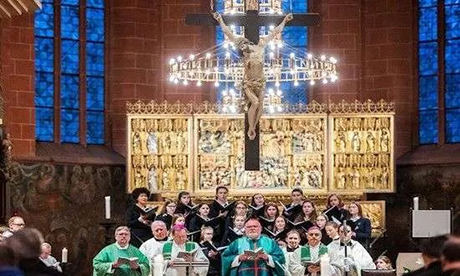Germany’s Synodal Path should be a model for reforming the Church globally, according to a leading outside observer.
Théo Péporté is past-president of the Council of Christian Churches in Luxembourg and former vice-president of SIGNIS (the World Catholic Association for Communications).
Péporté was one of 18 international observers who attended the 12-day Synodal Way procedure, and he was impressed by what he saw.
“This procedure is not only most exciting but absolutely necessary and definitely a model for the World Church,” Péporté told katholisch.de, the official website of the German bishops’ conference.
The bishops and the lay Central Committee of German Catholics (ZdK) commenced the Synodal Path at the end of 2019.
The catalyst was to address the massive defection of believers as part of the devastation caused by the clerical abuse crisis.
A clear majority of the Synodal Path delegates favour the reform course suggested by the procedure’s presidium, consisting of the bishops’ conference president and deputy president plus the ZdK president and vice president.
But that does not mean that opinions of the minority who are against Church reform were suppressed.
“Those who are of a different opinion, have their say and are respected like everyone else,” Péporté pointed out.
Péporté said the procedure has a significance well beyond the situation in Germany.
“We in Luxembourg and other European countries can learn a great deal from the participation of the laity in Germany.
“I very much hope that the considerations that were made here in Germany will flow into the worldwide synodal process,” said Péporté.
He noted that the shock of Germany’s clerical sexual abuse scandal could still be clearly felt at the plenary.
He said confidence in the Church had already been eroded well before the abuse scandals were exposed. The scandals, he argued, had merely accelerated Catholics’ loss of trust.
“Even bishops said: ‘We cannot carry on like this. The entire system must be renewed from the inside’. And it was most important that they invited the laity to join in as that is the only way renewal can be achieved,” Péporté said.
He explained that Catholics in his homeland of Luxembourg are carefully watching the German process.
The Churches in both countries have long been discussing similar issues.
Unfortunately, he said, the Church in Luxembourg has already become largely irrelevant.
Catholics there are no longer interested in ecclesial reform.
The Church hardly features any longer in the media, Péporté said.
“I can therefore only encourage German Catholics not to break off their connections with society in general. That is an added reason why the reforms are sorely needed.”
Sources
Additional readingNews category: World.




